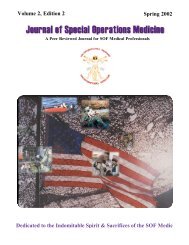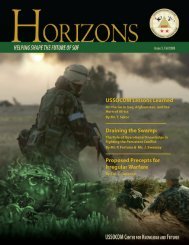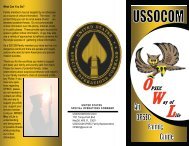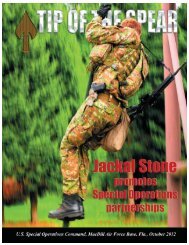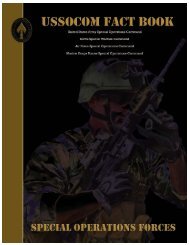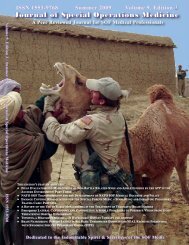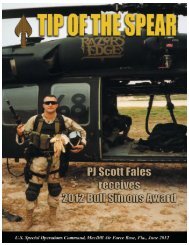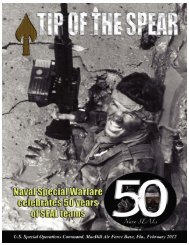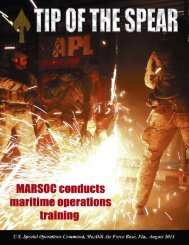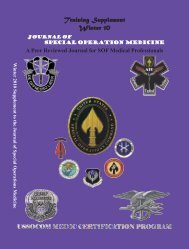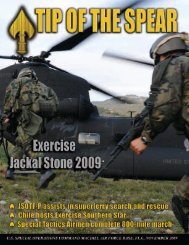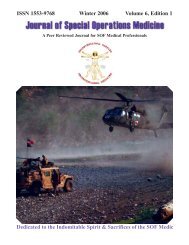HQ$History - United States Special Operations Command
HQ$History - United States Special Operations Command
HQ$History - United States Special Operations Command
Create successful ePaper yourself
Turn your PDF publications into a flip-book with our unique Google optimized e-Paper software.
Senator Sam Nunn (D-GA)<br />
Senator William Cohen (R-ME)<br />
Representative Dan Daniel (D-VA)<br />
6<br />
Cohen agreed that the U.S. needed a clearer<br />
organizational focus and chain of command for<br />
special operations to deal with low-intensity conflicts.<br />
In October 1985, the SASC published the<br />
results of its two-year review of the U.S. military<br />
structure, entitled “Defense Organization: The<br />
Need For Change.” Mr. James R. Locher III, the<br />
principal author of the study, also examined<br />
past special operations and speculated on the<br />
most likely future threats. This influential document<br />
led to the Goldwater-Nichols Defense<br />
Reorganization Act of 1986.<br />
By spring 1986, SOF advocates had introduced<br />
reform bills in both houses of Congress.<br />
On 15 May, Cohen introduced the Senate bill, cosponsored<br />
by Nunn and others, which called for<br />
a joint military organization for SOF and the<br />
establishment of an office in the Defense<br />
Department to ensure adequate funding and policy<br />
emphasis for low-intensity conflict and special<br />
operations. Daniel’s proposal went even further—he<br />
wanted a national special operations<br />
agency headed by a civilian who would bypass<br />
the Joint Chiefs and report directly to the<br />
Secretary of Defense; this would keep the Joint<br />
Chiefs and the services out of the SOF budget<br />
process.<br />
Congress held hearings on the two bills in<br />
the summer of 1986. Admiral William J. Crowe<br />
Jr., Chairman of the Joint Chiefs of Staff<br />
(CJCS), led the Pentagon’s opposition to the<br />
bills. He proposed, as an alternative, a new<br />
<strong>Special</strong> <strong>Operations</strong> Forces command led by a<br />
three-star general. This proposal was not well<br />
received on Capitol Hill—Congress wanted a<br />
four-star general in charge to give SOF more<br />
clout. A number of retired military officers and<br />
others testified in favor of the need for reform.<br />
By most accounts, retired Army Major<br />
General Richard Scholtes gave the most compelling<br />
reasons for change. Scholtes, who commanded<br />
the joint special operations task force<br />
(JSOTF) in Grenada, explained how conventional<br />
force leaders misused SOF during the operation,<br />
not allowing them to use their unique capabilities,<br />
which resulted in high SOF casualties.<br />
After his formal testimony, Scholtes met privately<br />
with a small number of senators to elaborate<br />
on the problems that he had encountered in<br />
Grenada.



